“This beautiful Bhagavatam is sufficient in itself for God realization. As soon as one attentively and submissively hears the message of Bhagavatam, he becomes attached to the Supreme Lord.” (Srimad- Bhagavatam 1.1.2)
by Satsvarupa dasa Goswami
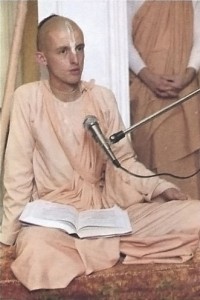 Every day, each of our Krishna consciousness centers holds an early-morning class in which a verse from Srimad-Bhagavatam is read and discussed. The book Srimad-Bhagavatam is a Vedic literature. Therefore, the subject matter is always the Supreme Personality of Godhead, Lord Krishna. In the Bhagavatam class there is no discussion of mundane topics concerning the temporary material world. Anyone who regularly takes part in hearing the Bhagavatam in the association of devotees will experience a cleansing of all inauspicious things from his heart.
Every day, each of our Krishna consciousness centers holds an early-morning class in which a verse from Srimad-Bhagavatam is read and discussed. The book Srimad-Bhagavatam is a Vedic literature. Therefore, the subject matter is always the Supreme Personality of Godhead, Lord Krishna. In the Bhagavatam class there is no discussion of mundane topics concerning the temporary material world. Anyone who regularly takes part in hearing the Bhagavatam in the association of devotees will experience a cleansing of all inauspicious things from his heart.
Our problem is that although we are eternal spiritual souls, we have identified ourselves with our temporary material bodies. In other words, we have forgotten who we really are. Most people think they are their material bodies—that is the inauspicious misconception that clouds our hearts. We have forgotten Krishna, the Supreme Lord, and we have forgotten our eternal relationship with Him. But one can revive that lost relationship and regain his original nature of eternity, bliss and knowledge—just by hearing about Krishna in the Bhagavatam class.
Regardless of one’s material designation, he should hear about Krishna. One should not object, “I am a Christian. I cannot hear about Krishna,” or “I am a Jew. I cannot chant the verses of the Bhagavatam.” Because Krishna is universal, He is transcendental to all designations. I have taken my birth in a certain race, a certain nation, a certain religious sect, a certain family—but that pertains to my material body, which I am not. Spiritually I am transcendental to all temporary designations. I am an eternal servant of God. One should revive such pure consciousness, beyond the scope of ethnic culture and sectarian religion, by hearing the transcendental message of Srimad-Bhagavatam.
When conducting Bhagavatam classes, the devotees begin by chanting a Sanskrit verse out loud. This is the same Sanskrit, word for word, that was originally composed 5,000 years ago by Srila Vyasadeva, the incarnation of Krishna who compiled all the millions of verses of the Sanskrit Vedic literature. The sound of congregational chanting of the Bhagavatam is transcendental, and purification takes place even for a hearer who does not understand a word of Sanskrit. These verses are sometimes compared to gold. Even in the hands of a child who knows nothing of its worth, gold is always valuable. Similarly, the transcendental sound vibration will always act to purify its hearers.
Before chanting the verse, the leader first chants the mantra “om namo bhagavate vasudevaya.” This is an invocation of the Supreme Lord and is translated,”! offer my obeisances unto the Supreme Personality of Godhead, who is all-pervading.” The chanting is responsive-the leader chants, and the congregation repeats. This hearing and chanting engage two important senses—the ear and the tongue—and thus the restless mind is captured, and one can think of Krishna, the goal of life.
Here follows a Sanskrit verse from the Bhagavatam (First Canto, Chapter Two, verse 18). At first glance it may seem no more than a jumble of foreign words, but actually it is not foreign. We humbly request you to try pronouncing the words, aided by the Sanskrit pronunciation guide found on page 2 of this magazine.
nasta-prayesv abhadresu
nityam bhagavata-sevaya
bhagavaty uttama-sloke
bhaktir bhavati naisthiki
The English translation of each word is expertly rendered by His Divine Grace A.C. Bhaktivedanta Swami Prabhupada:
nasta-destroyed; prayesu-almost to nil; abhadresu-all that is inauspicious; nityam-regularly; bhagavata–Srimad-Bhagavatam, or the pure devotee; sevaya-by serving; bhagavati-unto the Personality of Godhead; uttama-transcendental; sloke-prayers; bhaktih-loving service; bhavati-comes into being; naisthiki-irrevocable.
Srila Prabhupada has made all these literatures available as a service to humanity because by hearing Krishna’s message one can be freed from bondage to ignorance and repeated birth and death. Here is his English translation and purport of the Sanskrit verse.
TRANSLATION
“By regularly hearing the Bhagavatam and rendering service unto the pure devotee, all that is troublesome to the heart is practically destroyed, and loving service unto the glorious Lord, who is praised with transcendental songs, is established as an irrevocable fact.”
PURPORT
“Here is the remedy for eliminating all inauspicious things within the heart which are considered to be obstacles in the path of self-realization. The remedy is the association of the Bhagavatas. There are two types of Bhagavatas, namely the book Bhagavata [Srimad-Bhagavatam] and the devotee Bhagavata [a pure devotee of the Lord]. Both the Bhagavatas are competent remedies, and both of them or either of them can be good enough to eliminate the obstacles. A devotee Bhagavata is as good as the book Bhagavata, and the book Bhagavata is full of information about the Personality of Godhead and His pure devotees. Bhagavata book and person are identical.
“The devotee Bhagavata is a direct representative of Bhagavan, the Personality of Godhead. So by pleasing the devotee Bhagavata one can receive the benefit of the book Bhagavata. Human reason fails to understand how by serving the devotee Bhagavata or the book Bhagavata one gets gradual promotion on the path of devotion. But actually these are facts explained by Srila Naradadeva, who happened to be a maidservant’s son in his previous life. The maidservant was engaged in the menial service of the sages, and thus he also came into contact with them. And simply by associating with them and accepting the remnants of foodstuff left by the sages, the son of the maidservant got the chance to become the great devotee and personality Srila Naradadeva. These are the miraculous effects of the association of Bhagavatas. And to understand these effects practically, it should be noted that by such sincere association of the Bhagavatas one is sure to receive transcendental knowledge very easily, and the result is that he becomes fixed in the devotional service of the Lord. The more progress is made in devotional service under the guidance of the Bhagavatas, the more one becomes fixed in the transcendental loving service of the Lord. The messages of the book Bhagavata, therefore, have to be received from the devotee ‘Bhagavata, and the combination of these two Bhagavatas will help the neophyte devotee to make progress on and on.”
After reading Srila Prabhupada’s purport, his natural commentary on the verse, the devotee conducting the class will discuss the topic of that particular verse. All such discussion is exactly in accord with the authorized version presented by the spiritual master, who is coming in disciplic succession from Krishna Himself. But each Sanskrit word is such a treasure house of meaning that a devotee can expound on the subject infinitely, without deviating from the conclusion of the disciplic succession.. This assures the audience that the original truth, as first revealed by Krishna, is being exactly repeated with all its purity and potency intact.
The essential activity of life is to glorify Krishna, whose glorious activities can be understood properly from the book Bhagavata and the person Bhagavata. Glorification of Krishna, which is beneficial for all living beings, is performed by a devotee. In his purports to the prayers of King Kulasekhara, Srila Prabhupada has written, “A devotee of Godhead is he who glorifies the Personality of Godhead under the dictation of transcendental ecstasy. This ecstasy is a by-product of profound love for the Supreme which is attained by the process of glorification.” In other words, if one begins at once, even as a neophyte, to glorify Krishna as one has heard such glorification from his spiritual master, that will revive one’s original love for the Supreme Lord. Glorification is a natural principle of life, but now we are turning our attention away from all false glorification and here attempting to describe the philosophy and activities of the Supreme Personality of Godhead. Krishna Himself advises Arjuna to remember Him as being always a person.
“One should meditate upon the Supreme Person as the one who knows everything, as He who is the oldest, who is the controller, who is smaller than the smallest, who is the maintainer of everything, who is beyond all material conception, who is inconceivable, and who is always a person. He is luminous like the sun and, being transcendental, is beyond this material nature.” (Bhagavad-gita, 8.9)
Our spiritual master has told us of a poetic couplet he wrote that very much pleased his own spiritual master, His Divine Grace Bhaktisiddhanta Sarasvati Gosvami Maharaja: “The Absolute is sentient, thou hast proved./ Impersonal calamity thou hast removed.” God, or Krishna, is a person. He is not void or impersonal. God is a person, just as all the numberless living entities are. He is eternal and full of bliss, and in their original spiritual nature, all living entities share that eternal, blissful nature. But the difference is vast. Krishna is maintaining all others. All are fed by the One. For example, it is not man who provides the food for the elephants in the jungle, nor does man provide for the ants. That is done by God. He maintains everything, and He is the Supreme Person. He is the chief and original person, and we are His subordinate parts and parcels. The simultaneous oneness and difference between Krishna and all others can be explained by the following example. I am one with the President of the United States because we are both humans and both Americans, but the difference is that he is the chief American, whereas I am a subordinate. Similarly, Krishna is the Supreme Person, and everyone else is subordinate to Him.
Considering that Lord Krishna is vastly more powerful than anyone and that He is a person, one should recognize that His personal activities must be extraordinary. There is one verse in the Second Canto of the Bhagavatam where Krishna in His incarnation of Lord Rama is described as becoming so angry that His very glance generated burning heat in the ocean, causing fear to the fish and crocodiles. No one can be angry like the Lord. Srimad-Bhagavatam is made up of thousands of such verses describing the transcendental philosophy and superhuman activities of the Supreme Person.
In another canto of the Bhagavatam it is described that Krishna in His original form married 16,000 wives and that He expanded into 16,000 Krishnas to act as an attentive husband to each. One who knows the spiritual science of Krishna consciousness can understand how such acts are possible for God. Krishna expands Himself, by His feature called Supersoul, in the heart of every living creature, and as Supersoul He supplies everyone with memory, intelligence and forgetfulness. Therefore, since Krishna is in the hearts of all the countless living entities, it was not very difficult for Him to come out of the hearts of 16,000 women who were His great devotees and marry them. But only God can do such things. Some people call Krishna’s activities mythology, but they are facts. God is the Supreme Person, and His personal pastimes as presented in the Srimad-Bhagavatam are recited and glorified by the greatest transcendental poets and philosophers.
Whatever Krishna does, being absolute in quality, can liberate whoever submissively hears such pastimes. Krishna is also called Ranchor, which means “He who left the battlefield.” Ordinarily a warrior who leaves a battle is derided as a coward, but Krishna is worshiped in His feature as Ranchor in many temples in India. Chased by the demon Jarasandha, Krishna left a battlefield because He had to tend to another pastime, which also involved fighting with armies, to rescue His chief queen, Rukmini. At that time Krishna and His brother, Balarama, fled from the demon to the top of a high mountain. Jarasandha set the mountain on fire, and Krishna and Balarama leaped down from the mountain, which was eighty-eight miles high. No one can perform such feats but the Supreme Personality of Godhead. There are no activities within our experience that can compare to His pastimes.
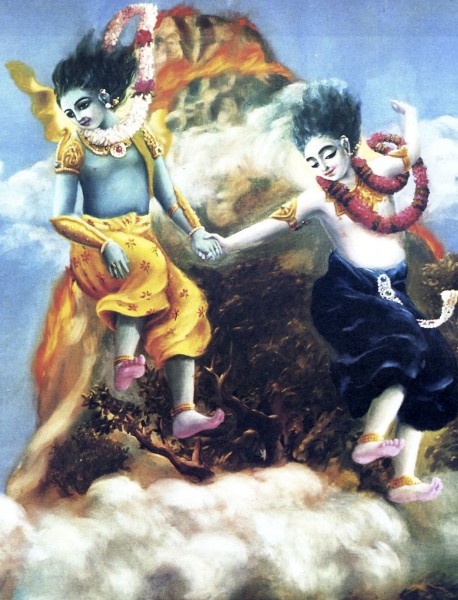
Of course, God can jump eighty-eight billion miles if He so desires. As stated in the Isopanisad, “The Personality of Godhead is more swift than the mind and can overcome all others running.” In His incarnation of Vamana, the Lord covered the entire universe in three steps. The Lord’s personal form has a bodily effulgence called the brahmajyoti, and in that light all the planets are sustained. One time, Lord Brahma, seeing Krishna engaged in His pastimes as a cowherd boy, doubted that He was God. He challenged and played a trick on Krishna by stealing His cowherd friends and cows. Krishna then proved Himself by manifesting the whole universe within His body, and Brahma fell down dumbstruck. At that time, Lord Brahma admitted: “You appear like a boy, but I know You are God. Your body has inconceivable potency.”
We must therefore come to understand Krishna’s supremacy in His form as a cowherd boy holding a flute in His two hands. Sometimes people formally profess, “Yes, God is unlimited,” but when the Supreme Lord comes to this world to give even a small indication of His limitless nature, foolish people deride Him. “No,” they say, “He couldn’t have lifted Govardhana Hill. He can’t appear in the brass Deity. He can’t appear in the chanting of His name.” People who think like this have a poor fund of knowledge. They know that they themselves cannot lift a hill, so they think that it must be impossible for God also.
The philosophers of the impersonal school do not believe that God is a person who has His own eternal activities. When they hear about Ramacandra’s eyes’ burning red-hot in anger, they take this description to be material. Srila Prabhupada writes, “They want to see negation in perfection.” This means that the impersonalist has a negative idea of spirit as no more than the opposite of matter. Because in this miserable material world there is a variety of people, activities, eating, talking, singing and so forth, they take it that spirit must be devoid of all variety and personality. They want to make everything zero, and they think this to be perfection. They take the Absolute Truth to be a kind of blank or void. But this idea of the Supreme is not supported by the version of the Vedic literature. Throughout the whole of the Vedic scriptures we hear that Lord Visnu, Lord Krishna, is the Supreme Personality of Godhead, the eternal source of everything. There is no void anywhere in His creation.
The impersonalists’ goal is to lose their personal identities and merge as one with the divine “white light,” the brahmajyoti. But, as we have explained, that effulgent light is only an aspect of Krishna’s supreme personality, and it is subordinate to Him. Nor can a living entity do away with his individual personality because, like the Supreme Lord, we are eternal persons. The impersonalist philosopher is fearful of real spiritual life because of his bitter experience with personal varieties in material life. He is like a man who has been ill in a hospital for a long time and who, when told that one day he will recover his health, eat normally and have many pleasurable activities, does not believe it because of experiencing only misery for so long.
But factually there is healthy, normal life. There is an eternal, blissful life of variety and personality in loving service to the Supreme Person. Certainly the activities and relationships of this material world are false because they are impermanent, but eternal truth is not void, zero or without variety. The Personality of Godhead has His own abode in the spiritual world, and it is described that “once going there, one never has to return to this world of birth and death.” We can qualify to go there and enjoy with Krishna in His eternal, blissful activities.
The best method for getting rid of all confusion about actual spiritual life is to hear the authorized version of Srimad-Bhagavatam. The purpose of holding the Bhagavatam class is to facilitate such hearing. One’s attraction for fleeting material pleasures will diminish as one hears about the pastimes of the Supreme Person with His pure devotees. All confusion about the nature of God and the living entity will be cleared up as one hears Krishna conscious philosophy from great authorities.
It is extremely important that one hear Bhagavatam from the right person, a bona fide spiritual master, if one tries to understand the pastimes of the incarnations of Godhead on his own, or if he is misled by a mundane academic scholar, he will come to the wrong conclusion and think that God is an ordinary man or that God is impersonal.
But who is the bona fide spiritual master from whom we must hear? Lord Krishna describes in Bhagavad-gita that one must “approach a spiritual master and inquire from him. . . because he has seen the truth. And when you have thus learned the truth, you will know that all living beings are but part of Me- and that they are in Me, and are Mine.” (Bg. 4.34-35) Therefore a spiritual master is one who teaches that Krishna is supreme and that we are His eternal servitors. Such a teacher carries the message of Krishna as it is. Krishna says, “Surrender to Me.” Therefore, the spiritual master does not misinterpret or change the meaning by saying, “Don’t surrender to Krishna. You are as good as Krishna. Forget Krishna.” There is a system of checks and balances. What the spiritual master says is also stated in the scripture and upheld by the disciplic succession of bona fide teachers. For example, Krishna first spoke the truth of the Bhagavatam to the first living entity, Brahma, who in turn spoke it to Narada. Narada spoke it to Vyasadeva, who spoke it to Sukadeva. In this way it has come down to the present age, and Srila Prabhupada, our spiritual master, is a bona fide teacher in this direct succession from Krishna.
In Bhagavad-gita Krishna further describes the person in Krishna consciousness in answer to Arjuna’s question, “What does a person in Transcendence look like? How does he speak, and how does he walk?” Krishna describes that such a person is not agitated by the happiness or distress of this material world. He controls his senses by fixing his consciousness upon the Personality of Godhead. Great spiritual masters like Brahma, Narada and Vyasa are liberated from material desires, and therefore their desire to speak of Krishna’s pastimes proves that the Lord’s pastimes are not material. Such liberated spiritual masters are not interested in telling fictional stories. Their meditation upon Krishna is accepted as meditation upon the highest transcendental truth.
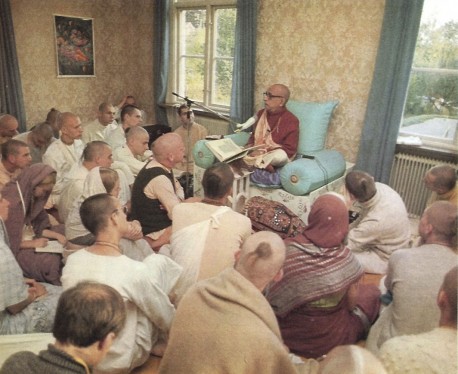
Lord Brahma prays to Krishna as follows: “My conclusion is that You are the Supreme Soul, Absolute Truth, and the supreme original person; and although You have expanded Yourself in so many Visnu forms, or in living entities and energies, by Your inconceivable transcendental potencies, You are the supreme one without a second. You are the supreme Supersoul.”
Such spiritual masters go everywhere just to speak to people about the glories of Krishna. And although Krishna is self-satisfied, He is always most pleased by His devotees. Therefore Krishna says that one should not be puffed up by his own accomplishments, but should humbly approach a devotee and hear Srimad-Bhagavatam from him. His Divine Grace A.C. Bhaktivedanta Swami Prabhupada has introduced to the West this timeless process of hearing about Krishna, and many sincere men and women have changed their lives and become devotees just by hearing the Bhagavatam. Now Srila Prabhupada’s authorized disciples are conducting Bhagavatam classes all over the world, in schools, universities, public festivals-everywhere. If people will simply give a submissive ear, the potent transcendental messages of Srimad-Bhagavatam can immediately clear all inauspicious conditions from the face of the earth.

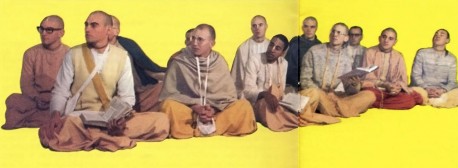
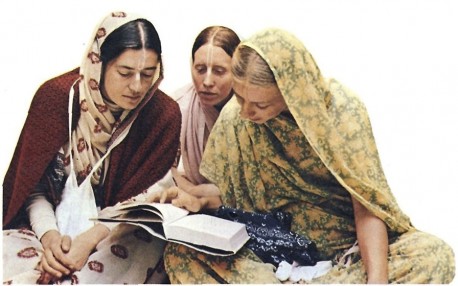
Leave a Reply